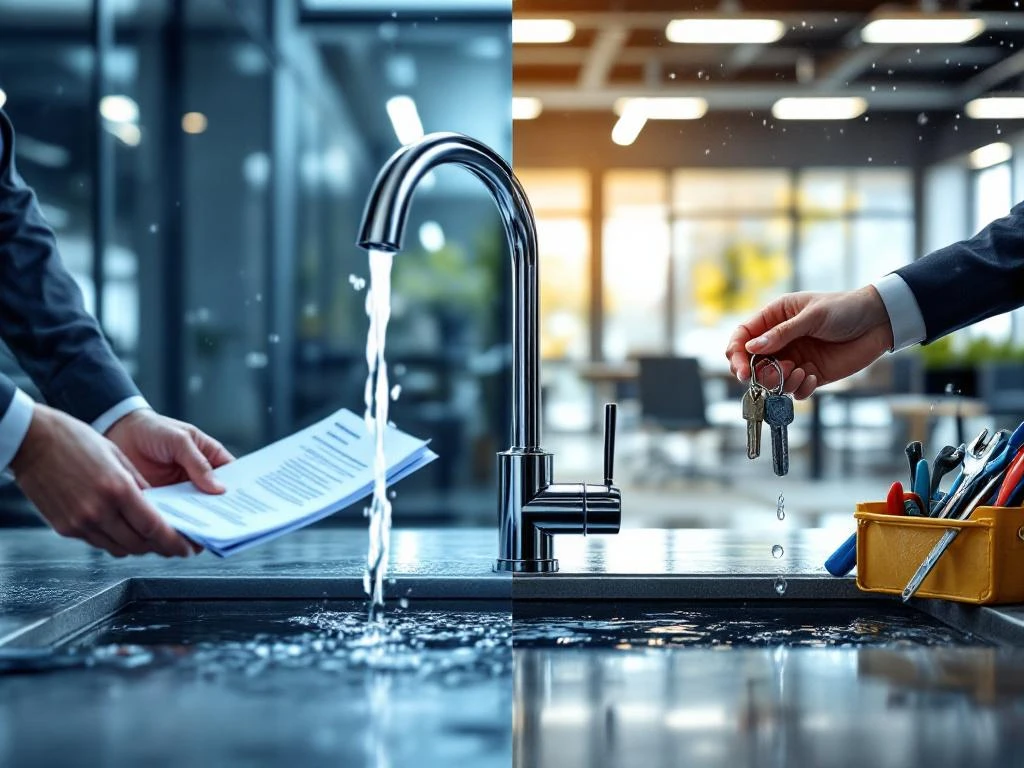For plumbing costs in a rental property, the landlord for major maintenance such as pipe replacement, boiler repair and structural leaks. The tenant pays for minor daily maintenance such as clogs due to improper use, scale on faucets and minor repairs to toilet seat or shower head. Dutch rental law makes this distinction between minor and major maintenance, the main rule being: obsolescence and wear and tear for the landlord, daily use for the tenant.
What are the basic rules for repairs in a rental property?
Dutch rental law divides maintenance responsibilities between tenant and landlord according to clear guidelines. The landlord is responsible for major maintenance and structural defects, while the tenant is responsible for minor daily maintenance.
Major maintenance includes all work related to the home's construction and main installations. Consider replacing the central heating boiler, repairs to the roof, renewing electrical wiring or replacing main pipes. These costs are always borne by the landlord, no matter how long you have been renting.
Minor daily maintenance consists of minor repairs and work resulting from normal use. Examples include replacing shower hoses, unclogging drains during normal use, lubricating hinges and replacing faucet leathers. As a tenant, you are responsible for this yourself.
The Minor repairs decision provides a comprehensive list of work covered by minor maintenance. This list is laid down by law and cannot simply be extended by the landlord in the lease. However, the tenant and the landlord can agree on a different division, but this must not be to the disadvantage of the tenant.
When does the tenant have to pay the plumber?
As a tenant, you pay the plumber when the problem arises from your use of the property or when it is minor daily maintenance. These are situations where you have influence over the occurrence or prevention of the problem.
Clogged drains from improper use are the most common example. Have you flushed grease down the sink, allowed hair to accumulate in the shower drain or flushed the wrong things down the toilet? Then the cost of unclogging is your responsibility. Even if your regular maintenance could have prevented the drain from clogging.
Leaking faucets due to scale deposits are also your responsibility. Regular descaling prevents faucet leathers from sticking or dripping. Replacing a faucet leak or a complete faucet head is typically minor maintenance that you need to arrange and pay for yourself.
Other examples of plumbing work at the tenant's expense include:
- Replacing the shower hose or shower head
- Toilet seat repair or replacement
- Replacing the float in the toilet cistern
- Unclog the sink under normal use
- Replacing siphons under sinks
In what cases does the landlord pay the plumber?
The landlord is responsible for all plumbing work that falls under major maintenance. These are usually costly repairs to the main systems or work caused by age and wear and tear on the property.
Replacement of pipes is always the responsibility of the landlord. Whether they are water pipes, drain pipes or gas pipes, they are part of the basic amenities of the home. If pipes become outdated, leak or no longer meet current standards, the landlord must have them replaced.
Repairs to the boiler are entirely the responsibility of the landlord. This applies to all parts of the heating system, including radiators, pipes and the thermostat. Annual maintenance of the boiler is also the responsibility of the landlord, unless other arrangements have been made.
Structural leaks that are not caused by misuse must be repaired by the landlord. Consider:
- Leaks in the wall due to broken pipes
- Rusting through pipes
- Leaks at connection points that are outdated
- Problems with the main valve or water meter
- Defects on recessed faucets or thermostatic valves
Plumbing that needs replacement due to age, such as a cracked sink, worn-out bathtub or broken shower pan, is also the responsibility of the landlord. These are not items that break down through normal use, but through years of wear and tear.
How does it work with drain clogs?
With clogs, payment responsibility depends heavily on the cause. The main rule is simple: clogs caused by misuse pay the tenant, clogs caused by sewer system defects pay the landlord.
Clogs from normal use can sometimes be a gray area. If you use the drain normally but it still gets clogged, it depends on the frequency and nature of the clog who has to pay. A light clog once a year usually falls under minor maintenance for the tenant. Regular clogs with no apparent cause often indicate a structural problem.
Misuse is usually obvious. The plumber can often see what is causing the clog. Common causes of misuse are:
- Flushing cat grit or other pellets down the toilet
- Frying fat or other grease down the drain
- Cigarette butts in the toilet
- Too much toilet paper or wet wipes
- Food leftovers in the sink without a strainer
If the blockage in the communal sewerage is located, for example in the down pipe of an apartment complex, this is always the landlord's responsibility. As an individual tenant, you cannot be held responsible for blockages in pipes you share with other residents.
What if the cause of the problem is unclear?
When it is not immediately clear who is responsible for a plumbing problem, good communication between tenant and landlord is important. Start by describing the problem in as much detail as possible and document everything with photos or videos.
A professional plumber can often help determine the cause. Ask the plumber to put a clear diagnosis on paper. The report should state what the problem is, what the probable cause is and whether it is normal use, misuse or a defect in the installation.
When in doubt, it is best to consult with your landlord before hiring a plumber. Present the problem and ask who the landlord believes is responsible. Make written arrangements about this via email or WhatsApp, so you can refer back to this communication later.
Should you not be able to work it out together, you can seek advice from:
- The Legal Help Desk for free legal advice
- The Rent Commission in maintenance disputes
- Legal expenses insurance if you have it
- The local tenants association
It is wise to always have a second opinion ask if the first plumber cannot identify a clear cause. Different plumbers may have different insights, especially with more complex problems.
Should you ask permission before calling a plumber?
Whether you must first seek permission from the landlord depends on the urgency of the situation and who is responsible for the costs. For emergencies, you may act immediately; for planable repairs, you must consult first.
Urgent situations where you may call a plumber immediately without permission are:
- A burst water main causing widespread flooding
- A gas leak (call the grid operator first!)
- Complete clogging of toilet without alternative
- No running water throughout the house
- Sewage flowing back into the home
In these cases, of course, you try to contact the landlord as soon as possible, but you don't have to wait for permission. The safety and habitability of the home come first. Do document the emergency well with photos and keep all receipts.
For scheduled repairs that fall under major maintenance, you should always contact the landlord first. After all, it is responsible for the cost and may want to send its own plumber. Give the landlord a reasonable time to respond, usually 8 to 14 days is considered reasonable.
For minor maintenance that is at your expense, you do not need to ask permission. You may choose your own plumber and have the work done. However, do inform the landlord if the work could impact the property, such as replacing a faucet.
What does the lease usually say about maintenance?
Most leases contain a standard provision on the division of maintenance responsibilities. This often refers to the legal Minor repairs decision and sometimes lists additional agreements.
In your lease, check especially the following items:
- The article on maintenance and repairs
- Any attachments with maintenance lists
- Agreements on reporting defects
- Deadlines for landlord to respond
- Specific arrangements for garden maintenance or common areas
Watch for deviating agreements that are to the detriment of the tenant. The law protects tenants from unreasonable provisions. For example, a landlord may not place all maintenance on the tenant or expand the legal list of minor maintenance. In doubt about the legality of certain agreements? Then seek legal advice.
Service charges can also be relevant to maintenance. If you pay service charges, check what exactly they are for. Sometimes minor maintenance or even certain major maintenance is included in the service charge. This should then be clearly specified.
When renting a office space in Amsterdam or elsewhere, maintenance arrangements may be different than for residential space. Business leases offer more room for different arrangements, so read these extra carefully.
How do you avoid discussions about plumbing fees?
Avoiding discussions starts with clear agreements and good documentation. At the start of the lease, take photos of all plumbing and fixtures so that you have recorded the initial situation.
Keep a log of all maintenance activities and problems. Record date, problem, action taken and any costs. This record helps demonstrate good tenant stewardship and can prevent discussions about the cause of problems.
Always communicate maintenance issues in writing. A WhatsApp message or e-mail is sufficient, but make sure you have proof of what was agreed upon. Verbal agreements often lead to misunderstandings.
Tips for tenants to avoid problems:
- Maintain plumbing fixtures regularly (descale, clean)
- Use drains for their intended purpose
- Report problems directly to the landlord
- When in doubt, ask for clarification in advance
- Keep all receipts and reports
For landlords, it is important to respond quickly to reports and communicate clearly about responsibilities. A good relationship with the tenant prevents many discussions. Also consider performing periodic preventive maintenance on installations.
Making a maintenance plan together with your tenant or landlord can remove a lot of ambiguity. In it you record who does what and when. This is especially useful when renting office space, where there are often more installations.
If you, as a tenant or landlord, have questions about maintenance responsibilities or other aspects of renting workspace, please feel free to take contact with us. We will be happy to help you with practical advice on how to best use and maintain your leased space.

